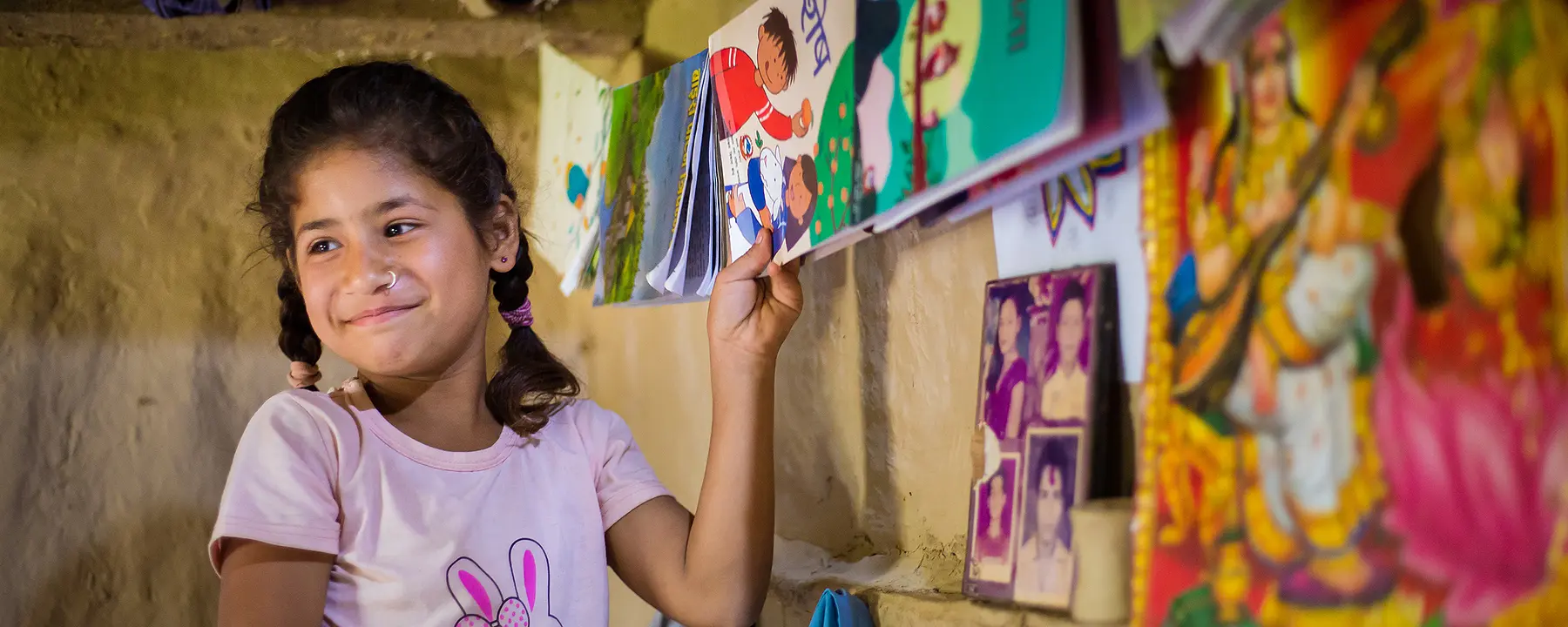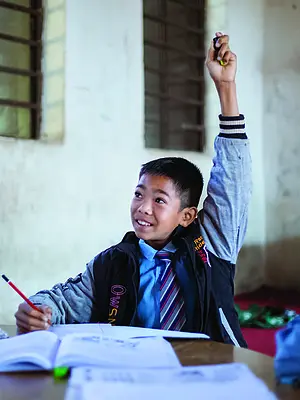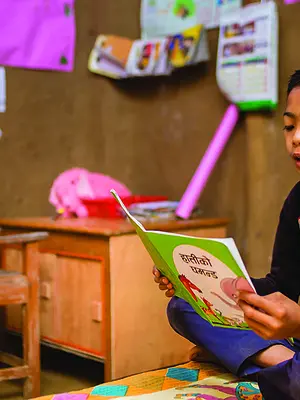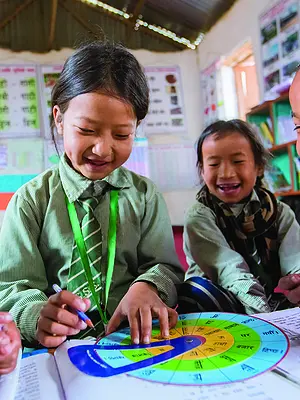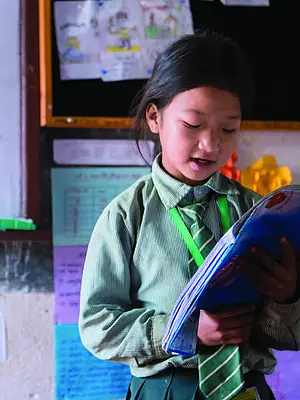USAID’s Early Grade Reading Program built a sustainable foundation for improving children’s reading fluency and comprehension in Nepal
Objective:
To improve reading skills of Nepali students in grades 1-3.
Approach:
Provided technical support to the Government of Nepal’s National Early Grade Reading Program (NEGRP), which aims to help children read with fluency and comprehension. NEGRP is led by the Ministry of Education, Science and Technology with support from USAID under the Ministry’s School Sector Development Plan.
Impact:
Results from the project’s 2020 end line evaluation showed that, the average number of correct words read per minute in second grade nearly doubled in four years: from 6.9 at baseline to 12.15 at end line. This represents progress toward Nepal’s national early grade oral reading fluency benchmark of 45 cwpm. The percentage of learners who demonstrated reading fluency and comprehension of grade level text at the end of grade 2 increased from 0.9% in 2016 to 3.21% in 2020.
USAID’s Early Grade Reading Program (EGRP) was implemented from 2015 to 2020. Read below about the activities and achievements. Read about subsequent activities in Nepal after EGRP.
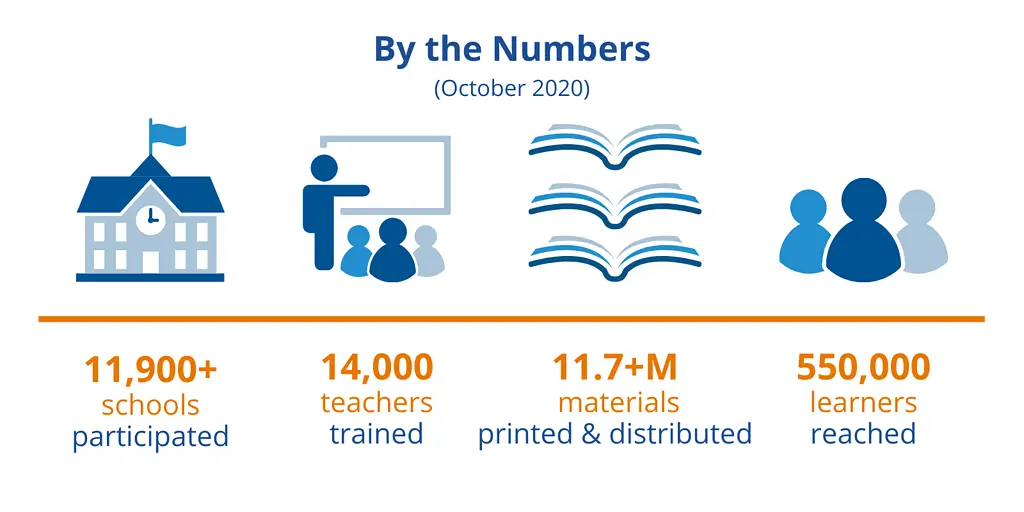
When you can read you can learn to do anything.
Reading lays the foundation for success in school and in life. Despite this widely recognized tenet, around the world, too many primary students either do not know how to read or read below their grade level.
In Nepal, results from a nationally-representative early grade reading assessment conducted with USAID’s support in 2014 showed that more than one-third of grade 2 students and nearly one fifth of grade 3 students could not read a single word of connected text, such as a short story. Students in both grades also had difficulty with reading comprehension—half of grade 2 and more than a quarter of grade 3 students were unable to answer even one comprehension question. Concerned by these findings, the Government of Nepal committed to ensuring that all children in Nepal develop the foundational skill of reading.
EGRP supported the Government of Nepal (GON) to improve the reading skills of public primary school students in grades 1–3 and to demonstrate an early grade reading model that could be scaled up throughout the country, in support of Nepal’s own National Early Grade Reading Program. In total, 11, 985 schools participated, benefitting over 550,000 students and 14,000+ teachers.
Led by RTI International with partners Another Option, Plan Nepal, Room to Read, and SIL LEAD, EGRP was active in 16 districts, Bardiya, Bhaktapur, Dadeldhura, Dang, Dhankuta, Dolpa, Kailali, Kanchanpur, Kaski, Manang, Mustang, Parsa, Rupandehi, Saptari, and Surkhet.
[View photo stories of the project's success below.]
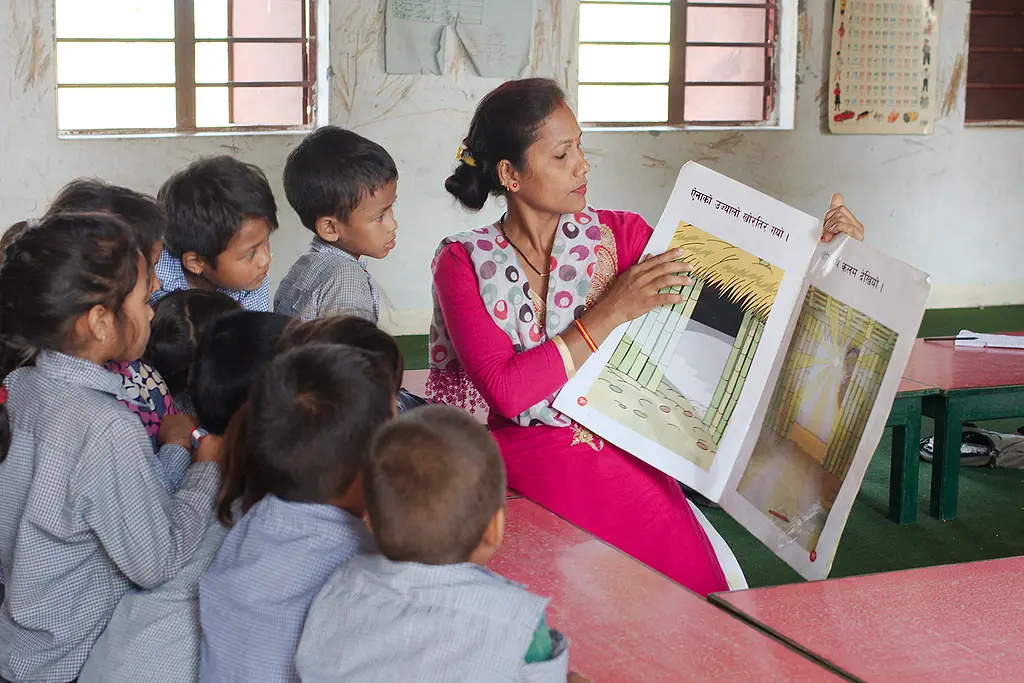
The Nepal Early Grade Reading Program introduced teachers to child-friendly approaches that engage students in creative ways rather than rote memorization. Photo by Swadesh Maharjan for RTI International
Improving How Teaching is Delivered
With EGRP technical assistance, the Government of Nepal developed improved teaching, learning, and reading materials (TLM) as part of the national early grade reading program and distributed 12 million TLMs to schools in the 16 target districts.
The program also supported MOEST to train 14,311 teachers about best practices in early grade reading instruction. Findings from the 2020 final evaluation indicated that EGRP technical assistance helped teachers change their behavior and include best practices in their reading lessons. This included child-friendly approaches that engaged students in creative ways rather than rote memorization.
EGRP experience has shown that improved practices by one teacher can influence the teachers in an entire district. One such teacher in Bardiya District, who has been teaching for more than 18 years, began changing the way he teaches Nepali after participating in a 10-day teacher professional development training supported by EGRP. His grade 2 class has now become a “model class” where other teachers come to learn from him.
Along with the training, he received grade-suitable TLMs—student workbooks and a teacher’s guide, as well as colorful supplementary books, pinwheel charts, and other resources—to make his class more interactive. Through a small grant provided by EGRP, he and his school’s leadership were able make the grades 1-3 classes “print-rich” by using posters and charts and painting the walls to surround the children with letters and words. They also stocked the classrooms with additional books and other reading materials to give student more opportunities to read. As a result, students are much more engaged as they learn through songs, games, and other interactive activities.
Before his training and the classroom improvements, this teacher estimated that his students read about 35 to 40 correct words per minute, and only about 55 percent understood what they read. Now he’s able to administer regular reading assessments (using a classroom-based early grade reading assessment) and can confidently say that his students’ speed and comprehension skills are almost up to the standard set by the government: For grades 1–3, a “good” reader reads 45 correct words per minute and understands 80 percent of what they read.
Due to his accomplishments, this exemplary teacher was asked to share his achievements with other head teachers and the heads of Local Education Units in Bardiya District in order to motivate these leaders so that many more children can benefit from effective approaches.
The improved learning materials—informed by research on how young children most effectively learn to read—are helping children across Nepal not only to read fluently by the end of third grade, but also to enjoy learning and going to school.
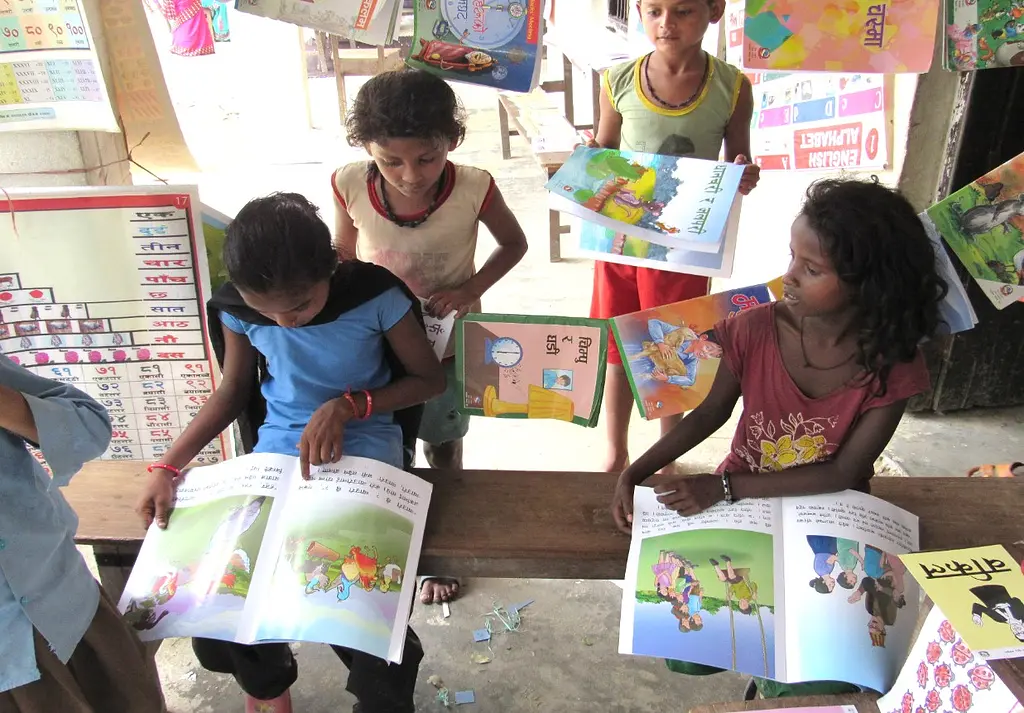
Children became more engaged and eager to learn with improved reading materials. Photo by Swadesh Maharjan for RTI International
Promoting the Importance of Mother-Tongue Learning
Imagine walking into a classroom for the first time and the teacher is speaking a language you don’t understand. In Nepal, where there are over 120 languages, Nepali is the language of instruction in the classrooms irrespective of the students’ mother tongue, so many students come to school and struggle to understand what is being taught.
The benefits of mother language instruction are clear. According to a study that gathered data from 22 developing countries and 160 language groups, children who were taught in their mother language were more likely to be enrolled in school, and a lack of mother language instruction was a significant reason for dropping out.
Similarly, EGRP’s impact evaluation demonstrated that although non-native Nepali students improved their reading skills between the baseline and midline assessments, the impact of the program was larger for students with Nepali as their first language than for students with a different mother tongue. This underscores the importance of targeted interventions for children who are learning in an unfamiliar language.
To help address this challenge, EGRP worked with Nepal’s Curriculum Development Center to develop theme-based mother-tongue materials (student books and teacher guides) in Tharu, Awadhi, and Maithili languages. These materials gave teachers practical techniques and recommendations for supporting their students who speak Nepali as a second language.
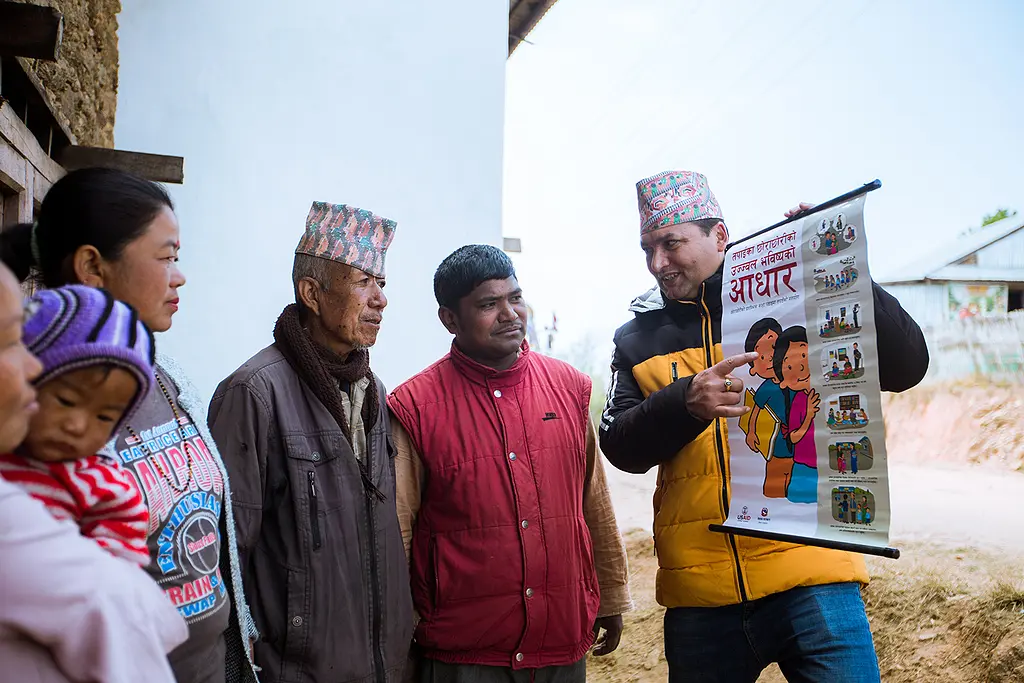
A peer educator in Nepal explained the EGRP program to community members and encouraged involvement in children’s learning. Photo by Merit Maharjan for RTI International
Empowering Communities to Promote Reading
In addition to promoting improved early grade reading instructional practices and materials, EGRP worked with parents and communities to increase their involvement in children’s learning. Through peer education training, along with other social mobilization activities, EGRP motivated parents to listen to their children read to them, visit their school to enquire about their studies, and create reading corners for their children at home. Through the efforts of peer educators, the program also informed parents about the far-reaching positive effects that focusing on their children’s early grade reading can have in other areas of child development and learning.
Our local peer educator is like our grandmother and we always listen to her. She visited our homes and convinced us to make reading corners for our children, interact with teachers regularly, and provide quality time to children. She convinced us that our support is important for our children to do well in their studies." - A mother of two young students, who is one of the many parents the peer educator has influenced after receiving training from EGRP
In an effort to improve classroom learning environments, EGRP worked closely with the government to select 1,500 schools for small grants provided to school management committees (SMC). As a result, students now sit on carpeted floors with low tables that make reading and writing easier. Walls are colorfully painted with the Nepali alphabet, words, days of the week and months, and pictures that encourage active learning.
The SMC grant program for school improvement has created a better learning environment in grades 1 through 3." - A grade 2 teacher in Saptari district
Other interventions made possible with SMC grants included mobile reading corners, reading festivals, parent–teacher conferences, and locally developed reading materials. These activities allowed for interaction and collaboration among parents, teachers, and members of the SMC and Parent-Teacher Associations, providing an opportunity to develop a common understanding of how to work together to improve children’s reading skills and how to sustain outcomes by incorporating activities into annual school improvement plans. Sixteen local non-governmental organizations (NGOs) also received grants that they used to support and monitor school and community-based activities, thus strengthening civil society’s role in improving children’s reading in the early grades.
Realizing the positive effects of the print-rich classrooms and other activities promoted by the grants, several municipalities have allocated funds in their local budgets for early-grade reading support and some schools have used their own resources to expand print-rich environments beyond grade 1-3 classrooms.
Building the Capacity of Local, Provincial and Federal Government
Local governments can play a key role in fostering a culture of reading. The involvement of local-level stakeholders has become even more critical since the creation of Nepal’s new constitution in 2015, which decentralized decision-making and resource allocation authority from the federal to lower levels.
EGRP-supported orientations for local government representatives across all 16 districts were instrumental in helping officials understand the goals of the government’s National Early Grade Reading Program (NEGRP) and create buy-in in their communities. District and provincial level capacity building workshops and study tours allowed local and provincial stakeholders to observe best practices, learn from each other, and apply improvements in their respective municipalities.
EGRP also worked with the federal government to formulate and disseminate policies and guidelines that standardized and harmonized the implementation of NEGRP for all stakeholders working in the early grades.
To help the Government of Nepal plan for expanding the program to all 77 districts of the country, EGRP supported development of a costed early grade reading “minimum package” specifying the basic components necessary to implement NEGRP.
To better inform decisions on instruction, materials development and assessment, EGRP also assisted the government in upgrading the country’s Integrated Education Management Information System to include data on the languages of students and teachers, along with the language of instruction in the classroom.
Three policy studies were carried out to enrich the knowledge base for policy decisions and reform in early grade education, including studies about time allocation to reading instruction in the early grade curriculum; language issues in reading instruction; and the feasibility of using cell phones to promote reading practice in the Nepal context.
In addition, EGRP provided technical support to the government in setting the national benchmark of 45 correct words per minute with 80 percent comprehension (based on analysis of children’s performance in previous assessments). This benchmark is now being used as a national standard to evaluate students’ reading achievement.
Paving a Path to Sustainability
The efforts of EGRP helped the government to continue rollout and expansion of NEGRP and RTI, with support from USAID, is continuing to work with the government of Nepal to improve learning outcomes through the Early Grade Reading Program II.
- U.S. Agency for International Development (USAID)
- Another Option
- Plan International Nepal
- SIL LEAD
